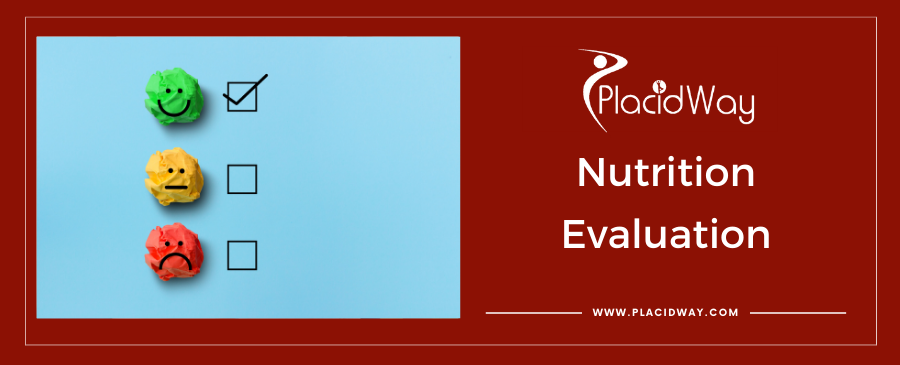
Unlock Your Health Potential: Your Guide to Nutrition Evaluation
In a world bustling with dietary advice, fads, and conflicting information, truly understanding what your body needs can feel like navigating a complex maze. This is where a comprehensive Nutrition Evaluation steps in. Far beyond just counting calories or recommending a generic diet plan, a personalized nutrition evaluation offers a deep dive into your unique physiological makeup. It’s a scientific approach to understanding your body’s specific nutritional requirements, identifying potential deficiencies or excesses, and paving the way for optimal health and well-being.
Imagine knowing precisely which nutrients you lack, how your metabolism truly functions, or how your diet impacts your energy levels, mood, and long-term health. A thorough nutrition evaluation provides these invaluable insights, forming the bedrock for a truly effective and sustainable wellness journey. It's not just about addressing current health concerns; it's about preventative care, enhancing vitality, and building a resilient foundation for the future.
For many, accessing such in-depth, personalized nutritional assessments can be challenging due to high costs or long wait times in their home countries. This is where the burgeoning field of medical tourism offers an exciting alternative. Traveling abroad for a nutrition evaluation not only makes these advanced services more accessible and affordable but also allows you to combine your health journey with a refreshing travel experience. PlacidWay connects you with world-class clinics offering state-of-the-art diagnostic tools and expert nutritionists, ensuring you receive a comprehensive and actionable plan, no matter where you are.
Are you ready to stop guessing and start knowing? Let's explore everything you need to understand about Nutrition Evaluation and how medical tourism can open doors to a healthier, more vibrant you.
What is a Nutrition Evaluation and Why is it Important?
At its core, a nutrition evaluation is a holistic assessment designed to uncover the intricate relationship between what you eat, your lifestyle choices, and your overall health. It's not just a quick chat about your diet; it's a multi-faceted process that can include dietary recalls, physical examinations, anthropometric measurements (like body composition analysis), and often, advanced laboratory testing to check for nutrient deficiencies, food sensitivities, metabolic markers, and even genetic predispositions.
The importance of this evaluation cannot be overstated. In an era where processed foods are abundant and nutritional science is constantly evolving, it's easy to fall into suboptimal eating patterns. A personalized evaluation helps to demystify nutrition for you, revealing how your body specifically responds to different foods and nutrients. This knowledge empowers you to make informed choices that directly impact your energy levels, immune function, mood, weight management, and susceptibility to chronic illnesses like diabetes, heart disease, and certain cancers. It shifts the focus from generic dietary advice to a precise, actionable roadmap for your individual health goals.
What Does a Comprehensive Nutrition Evaluation Involve? (Types/Components)
A truly comprehensive nutrition evaluation goes beyond surface-level observations. It integrates various components to paint a complete picture of your nutritional status. Here are the key elements you can expect:
- Dietary Assessment: This involves analyzing your current eating habits, food preferences, allergies, and typical daily intake. Tools like food frequency questionnaires or 3-day diet records help nutritionists understand your consumption patterns of macronutrients (carbs, proteins, fats) and micronutrients (vitamins, minerals).
- Anthropometric Measurements: This includes measuring height, weight, waist circumference, and often a detailed body composition analysis (e.g., using DEXA scan or bioelectrical impedance analysis) to assess body fat, muscle mass, and bone density.
- Physical Examination: A clinician may look for physical signs of nutritional deficiencies, such as skin changes, hair quality, nail health, and oral health.
- Biochemical/Laboratory Testing: This is a critical component. Blood and urine tests can reveal a wealth of information:
- Nutrient Levels: Measuring vitamins (e.g., Vitamin D, B12), minerals (e.g., iron, magnesium, zinc), and essential fatty acids.
- Metabolic Markers: Assessing blood glucose, insulin sensitivity, cholesterol profiles, liver and kidney function.
- Inflammation Markers: Such as C-reactive protein (CRP).
- Gut Health Markers: Stool tests can reveal microbiome imbalances, digestive enzyme deficiencies, or inflammation.
- Food Sensitivity/Allergy Testing: Identifying adverse reactions to specific foods.
- Lifestyle Assessment: Discussions about your physical activity levels, stress management, sleep patterns, and any medications or supplements you take.
- Genetic Testing (Optional but growing): Some advanced evaluations include genetic tests to understand how your genes influence nutrient absorption, metabolism, and disease risk, allowing for highly personalized recommendations.
By combining these different assessment types, nutrition experts can develop a truly tailored plan, moving away from "one-size-fits-all" advice to strategies that work specifically for *your* body.
Who Should Consider a Nutrition Evaluation?
While everyone can benefit from understanding their nutritional needs better, certain individuals or groups might find a nutrition evaluation particularly beneficial:
- Individuals with Unexplained Symptoms: If you suffer from chronic fatigue, brain fog, skin issues, mood swings, or frequent illnesses without a clear diagnosis, nutritional imbalances could be a contributing factor.
- Those with Chronic Health Conditions: People managing conditions like diabetes, heart disease, autoimmune disorders, or digestive issues (e.g., IBS, Crohn's) can significantly improve their quality of life and manage symptoms through targeted nutritional interventions.
- Athletes and Fitness Enthusiasts: To optimize performance, aid recovery, and prevent injuries, athletes require precise nutritional strategies tailored to their training demands.
- Individuals Seeking Weight Management: Beyond generic diet plans, an evaluation can identify metabolic issues or hormonal imbalances that impede weight loss or gain, leading to more effective, sustainable solutions.
- Pregnant or Breastfeeding Women: Nutritional needs are significantly higher during these periods, and an evaluation ensures both mother and baby receive adequate nutrients.
- Aging Adults: As we age, nutrient absorption can decrease, and needs may change. An evaluation helps address age-related nutritional challenges and maintain vitality.
- Anyone Committed to Preventative Health: If you're proactive about your health and want to mitigate future disease risks, a nutrition evaluation provides a powerful roadmap for long-term well-being.
Essentially, if you're looking to move beyond guesswork and genuinely understand how to nourish your body for optimal function, a nutrition evaluation is an invaluable tool.
What Are the Benefits of a Personalized Nutrition Plan?
The beauty of a personalized nutrition plan, born from a comprehensive evaluation, lies in its precision. Unlike generic diet recommendations found online or in magazines, a tailored plan considers your specific biochemistry, lifestyle, health goals, and even genetic predispositions. This level of customization leads to a multitude of benefits that impact every facet of your health:
- Enhanced Energy Levels: By addressing deficiencies and optimizing nutrient intake, you'll likely experience a significant boost in sustained energy throughout the day, combating fatigue and lethargy.
- Effective Weight Management: Whether you aim to lose, gain, or maintain weight, a personalized plan identifies metabolic roadblocks and creates strategies that work *for* your body, not against it, leading to more sustainable results.
- Improved Mood and Mental Clarity: The gut-brain axis is powerful. Optimizing gut health and nutrient intake (especially B vitamins, Omega-3s, and magnesium) can positively impact neurotransmitter function, leading to better mood, reduced anxiety, and sharper cognitive function.
- Stronger Immune System: A well-nourished body is a resilient body. Adequate intake of vitamins (C, D), minerals (zinc, selenium), and beneficial gut bacteria strengthens your immune defenses, making you less susceptible to illness.
- Better Digestive Health: By identifying food sensitivities, addressing gut flora imbalances, and recommending appropriate fiber and hydration, a personalized plan can alleviate common digestive woes like bloating, gas, and irregular bowel movements.
- Reduced Risk of Chronic Diseases: Perhaps the most profound benefit is the long-term impact on disease prevention. By proactively correcting imbalances and adopting health-promoting eating patterns, you can significantly lower your risk of developing conditions like type 2 diabetes, heart disease, certain cancers, and osteoporosis.
- Optimized Athletic Performance & Recovery: Athletes can fine-tune their nutrition to support intense training, minimize muscle damage, accelerate recovery, and enhance endurance and strength.
In essence, a personalized nutrition plan transforms your relationship with food from a source of confusion or struggle into a powerful tool for achieving and maintaining optimal health.
How Can a Nutrition Evaluation Help Prevent Chronic Diseases?
Chronic diseases, such as type 2 diabetes, heart disease, certain cancers, and autoimmune conditions, are often rooted in lifestyle factors, with nutrition playing a paramount role. A comprehensive nutrition evaluation acts as a powerful preventative tool by identifying subtle imbalances and risk factors long before they manifest as full-blown diseases.
For example, sustained high blood sugar levels (even pre-diabetic ranges) and insulin resistance can be detected early through specific blood tests during an evaluation. Similarly, chronic inflammation, often driven by diet, can be identified by markers like CRP. Nutrient deficiencies, like low Vitamin D, can contribute to weakened bones and immune dysfunction, while imbalances in omega fatty acids can impact cardiovascular health. By bringing these issues to light, the evaluation allows for proactive intervention.
Once these risk factors are identified, a personalized nutrition plan can be implemented to reverse or mitigate them. This might involve increasing fiber intake to stabilize blood sugar, incorporating anti-inflammatory foods, supplementing specific nutrients, or eliminating trigger foods. This proactive approach not only prevents the onset of chronic diseases but also improves overall health and quality of life, demonstrating that nutrition truly is foundational medicine.
What Role Does Advanced Testing Play in Nutrition Evaluation?
While traditional blood tests provide a good baseline, advanced testing elevates a nutrition evaluation from good to exceptional. These specialized tests delve deeper into your unique biochemistry, offering insights that conventional methods might miss. This can include:
- Genetic Nutritional Profiling: Analyzing specific genes (e.g., MTHFR, FTO) to understand how your body processes certain nutrients, metabolizes fats, or responds to different diets. This allows for truly personalized recommendations based on your inherent genetic makeup.
- Comprehensive Micronutrient Panels: Going beyond basic vitamin and mineral checks to assess intracellular levels and functional markers, giving a more accurate picture of true deficiency or sufficiency.
- Organic Acid Testing (OAT): This urine test can reveal markers for nutrient deficiencies, oxidative stress, gut dysbiosis, neurotransmitter imbalances, and mitochondrial dysfunction – providing a snapshot of overall metabolic health.
- Comprehensive Stool Analysis (CSA): A deep dive into your gut microbiome, identifying beneficial and pathogenic bacteria, yeast overgrowth, digestive enzyme function, and inflammatory markers in the gut.
- Food Sensitivity/Intolerance Testing: Pinpointing foods that cause delayed inflammatory reactions, leading to symptoms like bloating, fatigue, or skin issues, which differ from immediate IgE-mediated allergies.
The data gleaned from advanced testing is invaluable for precision nutrition. It allows nutritionists to move beyond generalized advice, crafting interventions that are highly targeted to your specific biological needs. For instance, if genetic testing reveals a poor ability to methylate (a crucial biochemical process), specific B vitamins in their active forms can be recommended. Or, if a stool test shows significant gut dysbiosis, targeted probiotics and dietary changes can be implemented. This scientific, data-driven approach ensures the most effective path to health optimization.
Why Travel Abroad for a Nutrition Evaluation? (Benefits of Medical Tourism)
Medical tourism for a nutrition evaluation is gaining traction for several compelling reasons, offering benefits that often surpass what's available domestically:
- Significant Cost Savings: This is often the primary driver. The cost of comprehensive nutrition evaluations, especially those involving advanced testing, can be exorbitant in countries like the U.S., Canada, or Western Europe. Countries in Asia, Eastern Europe, and Latin America often offer the same high-quality services at a fraction of the price, making advanced health assessments accessible to a wider population.
- Access to Advanced Technology & Specialists: Many international clinics specialize in cutting-edge diagnostic tools and have highly trained nutritionists, dietitians, and functional medicine doctors who are leaders in personalized nutrition. These experts might utilize technologies or approaches not yet widely available in your home country.
- Shorter Wait Times: In some healthcare systems, waiting periods for specialist consultations or specific tests can be lengthy. Medical tourism allows for prompt scheduling, enabling you to get evaluated and start your health journey sooner.
- Comprehensive & Holistic Packages: Many clinics abroad offer all-inclusive packages that combine the nutrition evaluation with other wellness treatments, accommodation, and even guided tours, providing a seamless and enriching experience.
- Opportunity for a Wellness Getaway: Combining your health assessment with travel allows for a refreshing change of scenery. The ability to relax and recover in a new environment can contribute positively to your overall well-being and commitment to new lifestyle changes.
By choosing medical tourism, you’re not just seeking a cheaper option; you’re often opting for a more comprehensive, timely, and even more enjoyable pathway to understanding and improving your nutritional health.
How to Choose the Right Clinic for Nutrition Evaluation Abroad?
Selecting the right clinic abroad for your nutrition evaluation is crucial for a successful medical tourism experience. Here’s a checklist to guide your decision:
- Accreditation and Certifications: Look for international accreditations (e.g., JCI - Joint Commission International) or reputable local certifications that indicate adherence to high standards of patient care and safety.
- Expertise of Specialists: Research the qualifications, experience, and specialization of the nutritionists, dietitians, and functional medicine doctors. Do they have expertise in the specific areas you're concerned about (e.g., gut health, sports nutrition, disease prevention)?
- Scope of Services & Testing: Ensure the clinic offers the comprehensive range of tests you're seeking, including advanced diagnostics like genetic testing, extensive micronutrient panels, or detailed gut microbiome analysis.
- Patient Testimonials and Reviews: Read feedback from previous international patients. Look for consistent positive experiences regarding the quality of care, professionalism, communication, and overall patient satisfaction.
- Communication and Language Support: Confirm that the medical staff can communicate effectively in English or your preferred language. Language barriers can lead to misunderstandings in diagnosis and treatment plans.
- Post-Evaluation Support: Inquire about follow-up consultations, remote coaching, or support services after you return home. A good clinic will ensure you have the resources to implement your personalized plan long-term.
- Transparent Pricing: Ensure the clinic provides a clear, itemized quote for all services, including consultations, tests, and any potential follow-up, to avoid hidden costs.
Leveraging a medical tourism facilitator like PlacidWay can significantly simplify this process, as they pre-vet clinics and specialists, providing you with trusted options that meet your specific needs and budget.
What are the Costs of Nutrition Evaluation Worldwide?
The cost of a comprehensive nutrition evaluation can fluctuate dramatically depending on the country, the clinic's reputation, the expertise of the specialists, and most importantly, the depth and breadth of the diagnostic tests included. While a basic consultation might be relatively inexpensive, advanced panels like genetic testing, extensive micronutrient analysis, or comprehensive gut health assessments significantly drive up the price.
Here's a general cost comparison to illustrate the potential savings of medical tourism (prices are approximate and can vary widely based on the specific tests and services included in a "comprehensive" package):
| Country | Estimated Cost Range (USD) for Comprehensive Evaluation | Notes |
|---|---|---|
| United States | $2,500 - $8,000+ | High-end clinics, extensive lab tests; insurance coverage varies greatly. |
| United Kingdom | $1,800 - $6,000+ | Private clinics, functional medicine approach; less advanced testing often. |
| Mexico | $800 - $3,000 | Popular for medical tourism, good quality, advanced testing available. |
| Thailand | $700 - $2,800 | Excellent medical infrastructure, popular for wellness tourism. |
| Turkey | $600 - $2,500 | Emerging medical tourism hub, competitive pricing. |
| India | $500 - $2,000 | Very cost-effective, rapidly growing in health and wellness tourism. |
These figures clearly demonstrate why many individuals choose to travel for a nutrition evaluation. The potential savings can be thousands of dollars, allowing patients to access top-tier services that might otherwise be financially out of reach.
What to Expect During Your Medical Trip for Nutrition Evaluation?
When you embark on a medical trip for a nutrition evaluation, especially with the assistance of a facilitator like PlacidWay, the process is typically well-organized and streamlined. Here’s a general outline of what you can expect:
- Pre-Trip Planning: This involves initial communication with PlacidWay to define your health goals, budget, and preferred destination. We'll help you select a suitable clinic, arrange appointments, and assist with travel logistics (flights, accommodation, visa if needed). You might also complete initial health questionnaires or dietary logs remotely.
- Arrival and Initial Consultation: Upon arrival, you'll typically have an initial consultation with the nutritionist or doctor. This is where you discuss your medical history, current health concerns, lifestyle, and dietary habits in detail. This session sets the stage for the specific tests recommended.
- Diagnostic Testing Phase: Over one to several days (depending on the complexity of the evaluation), you'll undergo various tests. This can include blood draws, urine collection, stool samples, body composition analysis, and possibly genetic swabs. The clinic will guide you through each step.
- Results Analysis and Follow-Up: Once all test results are processed (which might take a few days to a few weeks for highly specialized tests), you'll have a follow-up consultation. During this meeting, the nutritionist will explain your results in detail, highlight any deficiencies or imbalances, and present your personalized nutrition plan. This plan will include specific dietary recommendations, supplement suggestions, and lifestyle modifications.
- Departure and Ongoing Support: After receiving your plan, you'll depart for home. Many clinics offer virtual follow-up sessions to support you in implementing the recommendations. PlacidWay continues to offer support for any post-trip queries or further assistance.
The goal is to make the entire experience as comfortable and productive as possible, ensuring you return home not just with a comprehensive health plan, but also feeling refreshed and empowered.
How Can PlacidWay Assist with Your Nutrition Evaluation Journey?
Navigating the world of medical tourism can be complex, but PlacidWay is here to make your nutrition evaluation journey smooth, safe, and successful. We act as your trusted partner, offering end-to-end support to ensure you receive the best possible care abroad:
- Clinic Vetting & Selection: We have a curated network of internationally accredited clinics and experienced nutrition specialists. We'll help you compare options based on your specific health goals, budget, and desired location, ensuring you choose a reputable provider.
- Cost Transparency: PlacidWay provides detailed, transparent cost estimates from various clinics, allowing you to make informed decisions and budget effectively, often saving you thousands compared to domestic options.
- Travel Logistics & Support: From assisting with flight and accommodation bookings to arranging local transportation and interpreter services, we handle the intricacies of medical travel so you can focus on your health.
- Personalized Guidance: Our expert team offers personalized advice throughout your journey, answering your questions, addressing concerns, and providing peace of mind from initial inquiry to post-treatment follow-up.
- Access to Advanced Treatments: We connect you with clinics that utilize cutting-edge diagnostic tools and evidence-based nutrition approaches, ensuring you receive the most advanced and effective evaluation available.
- Seamless Communication: We facilitate clear communication between you and the medical team, ensuring all your questions are answered and your needs are understood before, during, and after your trip.
With PlacidWay, you gain a dedicated partner committed to helping you achieve your health and wellness goals through a stress-free and enriching medical tourism experience for your nutrition evaluation.
Are International Nutrition Evaluation Results Recognized Globally?
For most reputable clinics that cater to international patients, especially those with international accreditations like JCI, the results from their nutrition evaluations are generally well-recognized globally. This is because these clinics adhere to high medical standards and use advanced, scientifically validated testing methods comparable to those found in Western countries.
However, it's crucial to ensure a few things:
- Comprehensive Reporting: The clinic should provide a detailed report of all tests conducted, the findings, and the personalized nutrition plan in English. This comprehensive documentation makes it easier to share the results with your local doctor or nutritionist back home.
- Accreditation Matters: Clinics with international certifications are more likely to have their results accepted by other healthcare professionals worldwide, as these accreditations signify a commitment to global best practices.
- Discuss with Local Providers: It's always a good idea to inform your primary care physician or a local nutritionist about your international evaluation. While they may not have ordered the tests themselves, a detailed report from a reputable source will provide valuable information they can integrate into your ongoing health management.
In most cases, the data and insights gained from a high-quality international nutrition evaluation are highly valuable and can serve as a strong foundation for your long-term health and wellness strategy, regardless of where you are in the world.
Take the Next Step with PlacidWay
Ready to unlock your body's full potential and optimize your health? Your journey to a personalized nutrition plan is just a click away. Explore top-rated international clinics, compare prices, and get a free, personalized quote for your comprehensive nutrition evaluation with PlacidWay. Let us help you plan a seamless and transformative medical travel experience. Start your health optimization today!
Executive Treatment Abroad, Physical Exam Abroad





.png)
.png)
.png)
.png)

Share this listing